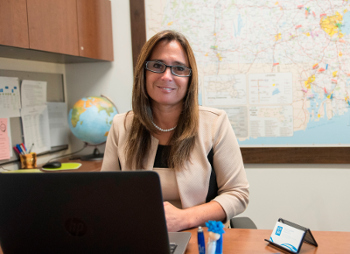Do you have a question about JRI services?

Interviews are part of the Caregiver Assessment. Incoming foster parents are often very nervous about these sessions. A professional is going to come to your home, ask invasive questions, and decide if you have what it takes to be a foster parent. It is very understandable to feel nervous! Let’s take a moment to better understand the purpose and the process of the interviews. You might feel a bit better at the end!
Who is Who
Interviews involve every person who lives in your home. Homefinders will interview everyone, even young children. This lets them see everyone’s personality, understand how family members relate to one another, and learn of any concerns a family member might have about fostering. Some interviews will take place one-on-one, while others will be for everyone at the same time.
It is important for Homefinders to get a sense of the roles every family member plays, how conflicts are resolved, and how decisions are made. By asking good questions and making careful observations, the Homefinder is better able to understand how the home functions.
Personal Histories
Caregivers will be asked to complete a questionnaire in advance of the interviews. The questionnaire asks about their personal histories, like where they grew up, who raised them, personal values, how they were parented, what they like about their family, what has challenged them in a family, and important events that have shaped them.
Personal histories help Homefinders understand potential triggers that might need to be addressed and how to support a foster parent through difficult times. When your foster care agency understands your history, they understand why you might have a certain reaction to a situation. The more your agency knows, the better they can relate to you and the more effective their matchmaking process will be.
Many folks we work with have difficult parts to their past. Whether it is a childhood that included parental substance use, an experience with domestic violence, or a history of food insecurity, many folks who become foster parents have pasts that include trauma. Please know that your Homefinder has heard many similar stories. Foster parents who have difficult pasts are often very resilient, solution focused, and empathetic. We do not want to use your past against you, but do want to understand how you’ve overcome from these challenges and know that you are in a firm place of healing before you enter the emotionally rigorous experience of foster care.
Connections and Supports
During the Interviews, your Homefinder will ask you and your household members about your connections to others. This can include people who often come to your home, family members and friends who are your support system, and community involvement like faith-based organizations, volunteer groups, or other groups you are part of. Foster parents who have good connections and supports are often our most successful parents. We want to understand how you use your support network and how they wrap around you during times of need (or don’t).
We will also ask if you engage with formal supports and connections, like therapy, psychiatry, group meetings, etc. These are not disqualifiers. If anything, they demonstrate your ability to reach out for help, find meaningful resources, and meet your own needs, which is an indicator of your ability to similarly advocate for a child in your home.
With some supports, like therapy or psychiatry, we will ask for references from them to ensure you are ready to foster. Our intention is for you to continue to see health and healing related to your needs, but also to ensure you are in a place to extend yourself further to foster without damaging the stability you’ve achieved.
We will also talk with you about people who might be able to become approved babysitters for your home. Children in care cannot be left with just anyone; babysitters have to consent to a background check, complete a short JRI training, and in some cases, also be CPR certified. If they will watch the children placed in your home overnight or very regularly, they may need to take MAPP class. We know that’s a tall order, so start thinking about that now!
Strengths and Areas of Experience/Knowledge
Every person brings unique strengths, experiences, and knowledge to the table. These are the things that will make you the right person to parent a child. It might be that you are experienced parenting a child diagnosed with ADHD, maybe you have experience caring for someone with diabetes and understand how to monitor blood sugar, maybe you are very patient, you were a daycare teacher, you understand processing disorders, or just have been resilient in your life. The more we know about your superpowers, the more we can find a child who will benefit from your skills.
Areas for Growth
We aren’t going to call these weaknesses, because they aren’t. During interviews, we may realize there are themes in your life that show repeated patters of difficulty. Maybe you had a very hard time parenting teenage children. Maybe you struggle with disrespectful people. Maybe you shut down and become passive in the face of confrontation. These are things we want to talk about because a) a child who moves into your home at 9 years old could still be with you when they are a teen, b) kiddos in care often struggle to trust adults and as part of that might behave disrespectfully, or c) foster parents are often faced with confrontations/negative energy and need to be able to effectively respond. Whatever the area for growth is, we are going to discuss it so you can assess if that is possible and how that might be achieved.
It might not be a pattern of behavior or piece of your past that is an area of growth. Many new foster parents have not parented before. They do not have biological, adoptive, or chosen children, so this is going to be a new experience. Some folks have never heard of Trauma Informed Parenting, so parenting practices they’ve previously used may need to be set aside for new methods. We are going to talk about how willing you are to learn and grow.
Routines
Some kids do well in a busy household, while others do well in a very quiet, predictable, insular household. It is important to understand what a week looks like for you. When do you leave for work, when do you come home, what typical appointments or obligations do you have? Do you often have guests who come over, or are the people in your home generally just the people who live there? We want to understand as much as we can. There are absolutely changes that happen to a foster family’s schedule and routine, so you will need to be willing to accommodate that. Knowing what your average day looks like helps us imagine how dynamic those changes will be and what kind of supports you will need to have in order to maintain as much of typical life as you can.
Values, Rules, and Expectations
It is important for us to understand how your household operates. Everyone who lives in your home knows the rules: you can get food whenever you want it, you can do your own laundry, you need to take your shoes off when you enter the home. Those things are automatic for you, but for a child moving in, they have to learn the nuances of your home. Some folks are flexible, while others are pretty rigid in terms of what can or cannot change. It is important that we understand this.
Values are what you think is important in life. Values are typically things like honesty, respect for others, and being helpful around the house. Some folks have more and they are very specific for everyone. Is trying your best in school acceptable, or is there a specific grade one should attain? If someone expresses respect differently, how do you negotiate those differences? If a child has been raised with different values, what do you do?
Expectations for children are often rooted in our own experiences. Do kids need to have chores? Are they written down, or more open ended like “When asked to help, please help”? Do kids need to be able to do things by certain ages, or do you see progress as an individual continuum? We will talk about your expectations for children and how this might shift.
Consequences, Discipline, and Broken Rules
Things don’t go well every day. In fact, there will probably be an issue of some kind on most days. It might be small or it might be big. What happens when kids do something wrong? We are going to talk about how that was handled in your household growing up, what you liked about how that went and what you did not like, and how you parent your children similarly or differently/how you think you might parent similarly or differently if you will be a first time parent. We will ask you about what discipline is and how it is achieved. If you have children, we are going to ask them about household rules, expectations, and what happens when things don’t go as planned.
Individualized Questions
Every home is different. Every person in your home is different. We cannot tell you all the questions we will ask or categories we might cover. We can say that the goal of our nosiness is to understand who you are. The more we understand, the better we can do in supporting your efforts to become a foster parent and assessing if that goal is a fit. We want you to be successful in life and the more clearly we recognize who you are, the better we can do that.
How Many Interviews
We always have at least three interviews, but in most cases it is more. Between meeting with you individually and together, discussing things that come up over the course of MAPP class, and clarifying to be sure we understand you well, we will spend a lot of time talking with you. Most sessions will be in your home, though some can be via video conferencing.
After Interivews
Once we’ve completed our interviews, your Homefinder will synthesize all that information into your Caregiver Assessment. It is a formal document created by the Department of Children and Families. It takes quite a lot of work to create this, so please give your Homefinder time. They will then have supervisory JRI staff review it. Typically, there will be some more questions that the staff will have and your Homefinder will connect with you to get those answers. This could be just a quick phone call, an email, or a visit (in person or video conferencing). The intention is to make sure everyone can clearly understand you and your past. Our goal is to find families that are safe, capable, and ready to endure the rigors of foster care.
Ready to apply? Please fill out our application today!



